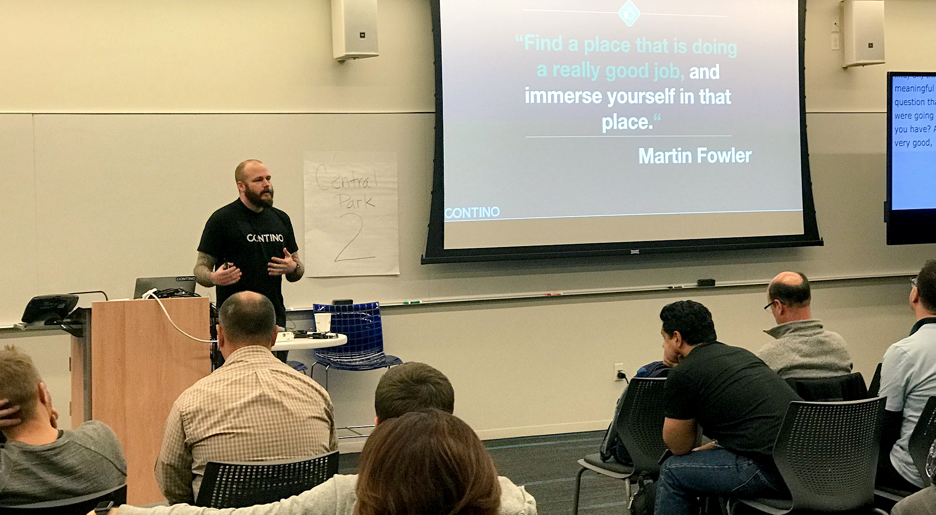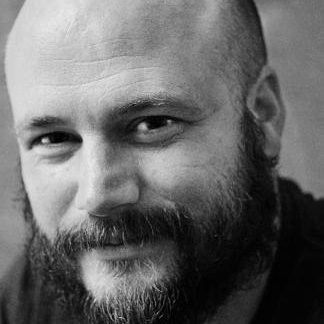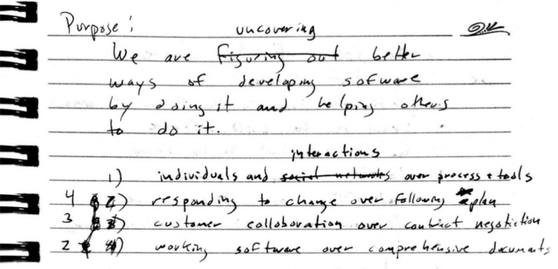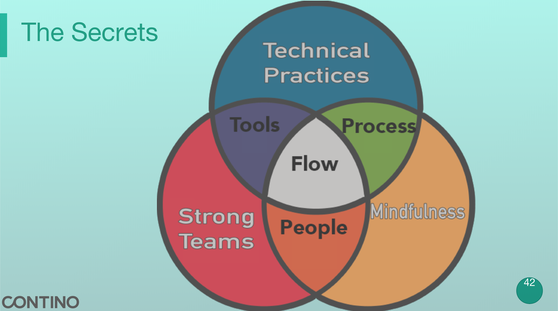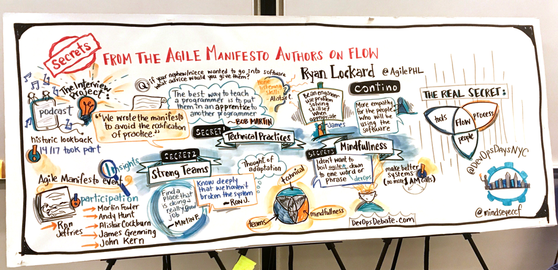Secrets of the Agile Manifesto Authors: Ryan Lockard at DevOps Days New York
Ryan Lockard is the VP of Consulting at Contino, and he recently gave the closing keynote at DevOps Days NYC on the ‘Secrets of the Agile Manifesto Authors on Flow’.
Clouds, cocktails and dojos.
Late last week, a sold-out crowd of 300 people gathered in midtown Manhattan for two days to discuss those topics, among others, at DevOps Days NYC.
On the first day, for example, Randy Shoup, former chief engineer at eBay, shared his experiences about moving fast at scale. What does he tell his teams when they get overly excited and try to take on too much? “Fewer things, more done,” he said to some laughs. “I know it’s not grammatically correct, but it’s easy to remember.”
So when Ryan Lockard, VP of Consulting at Contino, entered the main room on Friday afternoon to give the closing keynote, there had already been two full days of presentations and breakout conversations. But a large crowd stuck around, delaying the start of their weekends, perhaps intrigued by the title of his talk, “Secrets from the Agile Manifesto Authors on Flow.”
As the host introduced Lockard, he mentioned the description had piqued his interest, and that he had been looking forward to this one for a while.
Lockard didn’t disappoint (and apparently one of his slides went viral). He was comfortable and engaging (even with a scratchy voice from battling a cold) as he weaved in interesting quotes and behind-the-scenes stories about the events that led to the creation of the Agile Manifesto in 2001 (fun fact: their meeting was originally called the Lightweight Methods Conference).
Ryan’s insights, including how they picked the term agile, came from first-hand conversations he had with 14 of the 17 Agile Manifesto authors as part of a podcast series on Agile Uprising, a community Ryan co-founded. This included luminaries such as Martin Fowler, Andy Hunt, Bob Martin, Alistair Cockburn among many others!
For the unfamiliar, the Agile Manifesto boils down to what Jon Kern, one of the authors, described as “four measly bullet points.”
- Individuals and interactions over processes and tools
- Working software over comprehensive documentation
- Customer collaboration over contract negotiation
- Responding to change over following a plan
Notes from Andy Hunt's notebook
After the group came up with the message of each bullet, they then debated the order of the bullets before settling on the above. It should be noted that the second part of each bullet is not unimportant, but the first part was deemed to be more important.
Lockard’s conversation with Kern was one of the first interviews recorded for the project, and he jokingly highlighted his lack of podcasting experience at that point. Sitting in a noisy bar, with his iPhone balanced on top of a beer glass, he realized that perhaps it wasn’t the most ideal setup for an audio interview. But that interview, as did all of them, yielded some terrific information.
Later, after listening to all 14 interviews and pulling out common themes, Lockard boiled the manifesto’s essence down to three key areas:
Build strong, empowered teams
Be a good team member, establish trust and set social standards.
Also, don’t forget to continue to grow. As Andy Hunt said, “One of the central concepts people lose is the thought of adaptation.”
Refine technical practices and engineering culture
A key takeaway on this point was honing technical expertise and doing things the right way.
How do you do this? Bob Martin said: “The best way to teach a programmer is to put them in an apprentice to another programmer.” But empowerment in this context is crucial, as Ron Jefferies told Lockard, “I don't ask permission to write a test or refactor, any more than I ask for permission to write an ‘if’ statement or a ‘for’ loop.”
Establish mindfulness
This encompasses empathy, deep listening and having and articulating a common goal. “I don’t want to boil all of agile down to one word or phrase,” Bob Martin said in his interview, “but it does boil down to pride of workmanship.”
The Secret
The secret is wrapping the ‘DevOps mindset’ around the principles above. The three core circles intersect with people, process and tools (the foundation of DevOps) to create “flow”. Flow is defined as single-minded immersion in the task at hand due to the availability of three factors: a clear set of goals, immediate feedback, and the right balance of skills commensurate to the difficulty of the task. It’s a highly productive and enjoyable state of mind.
In another interview with Martin Fowler, Fowler was asked what he would tell his niece or nephew if they were starting out in the industry. “Find a place that is doing a really good job,” Fowler said, “and immerse yourself in that place.”
Lockard agreed with the sentiment and said one of the reasons he works at Contino is that he can constantly be surrounded by smart people and routinely learn something new.
As for the origins of the term agile? According to Lockard, they wrote down a bunch of different names on notecards and agile was the one they hated the least.
If you’d like to hear him in person, Lockard will be giving the opening keynote at the Regional Scrum Gathering® Canada in Toronto on March 26.
A SlideShare of Ryan’s talk can be found here.
